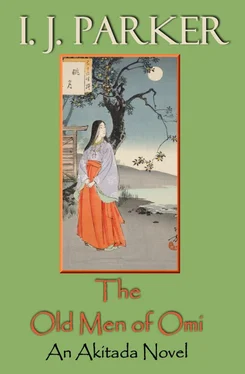I. Parker - The Old Men of Omi
Здесь есть возможность читать онлайн «I. Parker - The Old Men of Omi» весь текст электронной книги совершенно бесплатно (целиком полную версию без сокращений). В некоторых случаях можно слушать аудио, скачать через торрент в формате fb2 и присутствует краткое содержание. Год выпуска: 2015, Жанр: Исторический детектив, на английском языке. Описание произведения, (предисловие) а так же отзывы посетителей доступны на портале библиотеки ЛибКат.
- Название:The Old Men of Omi
- Автор:
- Жанр:
- Год:2015
- ISBN:нет данных
- Рейтинг книги:4 / 5. Голосов: 1
-
Избранное:Добавить в избранное
- Отзывы:
-
Ваша оценка:
- 80
- 1
- 2
- 3
- 4
- 5
The Old Men of Omi: краткое содержание, описание и аннотация
Предлагаем к чтению аннотацию, описание, краткое содержание или предисловие (зависит от того, что написал сам автор книги «The Old Men of Omi»). Если вы не нашли необходимую информацию о книге — напишите в комментариях, мы постараемся отыскать её.
The Old Men of Omi — читать онлайн бесплатно полную книгу (весь текст) целиком
Ниже представлен текст книги, разбитый по страницам. Система сохранения места последней прочитанной страницы, позволяет с удобством читать онлайн бесплатно книгу «The Old Men of Omi», без необходимости каждый раз заново искать на чём Вы остановились. Поставьте закладку, и сможете в любой момент перейти на страницу, на которой закончили чтение.
Интервал:
Закладка:
The monks laughed. One said, “The laws are ours. And so is this man.”
The laborer cried, “I’m a free man. I’m a free peasant. They drove me off my land. Help me!”
One of the sohei who had a grip on him, snarled, “Shut up, you dog!” and shook him. The other brute punched him viciously in the side. The laborer sagged to his knees and vomited.
Tora clenched his fists and was about to intercede when the clerk in his sober, dark gown and black cap said sharply, “Stop that! He told the truth. He came to us and proved he was free. I signed him on. He’s an honest man who has served in the northern army. You’ve got the wrong man.”
The monk who had punched the worker laughed. “If he’s a soldier, he’ll get to fight again.” He turned to the laborer. “Tell them! You know what’s good for you, don’t you, fellow? You’ve got a family, haven’t you? What’s to become of them if you don’t obey the temple?”
A look of fear passed over the laborer’s face. He nodded and got to his feet. “I’ll go with them,” he said dully. The sohei grinned. The one with the sword said, “See? All is well. He’s one of ours all right.”
When they turned to leave with the man, Tora stepped in their way. “Halt!” he snapped. “That man stays here. If you have a claim, you can take the matter up with the governor. It’s against the law to kidnap people.”
The sohei stared at him from their white head cowls, taking in his half armor and sword. Their spokesman said, “No need to interfere, Officer. He’s one of our peasants. A run-away. It’s our business to round up such men.”
Suddenly the worker flung himself to his knees before Tora and clasped his legs. “Don’t let them take me, sir!”
One of the bullies snarled, “Up, shitface!” and clenched a fist to strike him again
Tora pushed him back. The monk stumbled, but his companion cursed and came at Tora. He was huge, with fists like sledge hammers, and he was fast. Tora tried to jerk aside, but a glancing blow landed on his cheek. His head snapped back and for a moment he saw stars. When his eyes cleared, he saw that two of the monks had lowered their halberds.
Tora was badly outnumbered and he had no doubt that all four of them were trained fighters. Besides, a sword is at a disadvantage against a halberd. But he drew his sword anyway and stood his ground, crouching slightly and balancing on the balls of his feet, ready to move in any direction when the attack came.
Nothing happened for the space of several breaths. Then the monk with the sword said, “Leave him be. His time will come.”
There was some foot shuffling and a good deal of glaring, but eventually the three sohei with halberds obeyed and all four stalked away. The laborer still knelt on the ground and sobbed.
Tora asked him, “Will they come back for you?”
The laborer wiped his eyes and blinked up at him. “Maybe, maybe not. Are you with the provincial guard?”
“No, but I know the governor.” Tora’s cheek started to hurt. He looked around. “What’s going on here?”
The overseer came up and said, “Thank you, Officer. Please tell the governor that those bastards come down from their mountain whenever they need more slaves. They help themselves to the best workers and claim they escaped from temple land and owe them labor or money. Somebody should put a stop to this. He was the third man they tried to grab this week.”
“He seemed willing enough to go with them in the end,” said Tora, frowning.
The laborer said sadly, “I’ve got a wife and children. They might get them, too.”
Tora’s eye was throbbing. He wondered if he had made things worse. “I take it you prefer to work here. But if you really left their land, they have a right to make you go back.”
The overseer looked disgusted. “You can believe what you want, but around here we’ve learned not to trust those hooded bastards.” With that he turned and shouted orders at the other bearers, who had stood at a distance, watching the encounter. Soon the line formed again and the rice moved out of the boat and onto the land. The laborer got to his feet, nodded to Tora, and joined them.
The clerk shook his head and walked away.
Tora stood for a moment longer, then walked back to the wine shop. He did not like what he had just witnessed. Even if the monks had the law on their side, they should not be allowed to enforce it themselves. What was the world coming to, if every landowner simply arrested his people without taking the matter to the governor or prefect?
Okura was sitting at one of the outside tables. Also waiting was a flask of wine and two cups. Tora cheered up.
“The next round is mine,” he said, emptying the cup Okura handed him. He smacked his lips. “Not bad. You know your suppliers.” He held out the cup for a refill.
Okura obliged, then asked, “What happened to you?”
“A small disagreement with some fractious monks. Four of those sohei raided the laborers unloading a boat and tried to take one of the men away. I interfered. What’s going on here?”
Okura’s face fell. “Those cursed sohei ,” he muttered. “They’re always at it. They’re either recruiting new soldiers or arresting men for hard labor on their land. They own just about all the land in Omi.”
Shocked, Tora said, “Surely not.”
“Well, close to it. Onjo-ji and Enryaku-ji between them own or control hundreds of hamlets. The peasants and landowners signed over their estates to gain tax-free status. The temples allow them to keep their harvest and buy their rice at a discount. That way, both profit.”
“That should be against the law.”
“Who’s going to oppose a powerful temple? The court always decides in favor of the monks.”
“Surely the governor can put a stop to what I just saw?”
Okura shook his head. “He’s a good man, but he will not tangle with either temple.”
“Well my master’s here to do just that,” Tora said angrily. “I’ll let him know what’s going on.”
“Good luck!” Okura grimaced. “I’d like to see it. We’ve had too much trouble, and it’s been getting worse lately. But drink up. You owe me some stories concerning that warlord Uesugi. We heard about it in our camp, but it was winter and the news was hard to come by.”
The wine was good and Tora complied.
Chapter Six
Akitada returned to provincial headquarters to check on the progress of the temple dispute and found the work progressing to his satisfaction. Then he went to Kosehira’s office. His friend was deep in paperwork, three young clerks standing by and a scribe scribbling furiously as the governor dictated.
“Akitada!” said the governor, emerging somewhat dazed from a document. “Dear me, is it time already?” He glanced through the open doors. The sun was well past midday. “Forgive me. A sudden press of work. Would you mind going back by yourself? Tell my people that I expect to get home by sunset. I have neglected you shamefully.”
“Not at all,” said Akitada. “I’ve had a very pleasant time with Chief Takechi. We were doing a bit of reminiscing. I’ll see you later then.”
He got back on his horse and enjoyed the short journey back up the hillside. At the villa, he turned the animal over to the stable boy and then went to deliver Kosehira’s message. He found the younger children romping in the garden with Kosehira’s eldest daughter.
They greeted him eagerly. Yukiko, in a charming red embroidered jacket and pale green gown over white trousers, claimed he looked tired. “Come, Cousin Akitada,” she said, taking his hand and leading him to a small summerhouse overlooking the shimmering lake, “you must rest and admire the pretty view. I love it here.”
Читать дальшеИнтервал:
Закладка:
Похожие книги на «The Old Men of Omi»
Представляем Вашему вниманию похожие книги на «The Old Men of Omi» списком для выбора. Мы отобрали схожую по названию и смыслу литературу в надежде предоставить читателям больше вариантов отыскать новые, интересные, ещё непрочитанные произведения.
Обсуждение, отзывы о книге «The Old Men of Omi» и просто собственные мнения читателей. Оставьте ваши комментарии, напишите, что Вы думаете о произведении, его смысле или главных героях. Укажите что конкретно понравилось, а что нет, и почему Вы так считаете.












